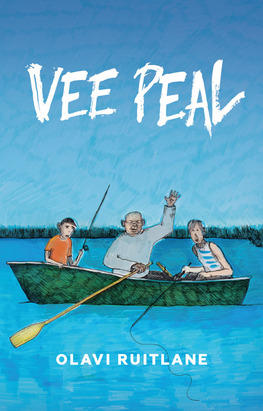Olavi Ruitlane, Vee peal (On the Water)
Tallinn, ZA/UM, 2015. 196 pp
ISBN: 9789949384693
Olavi Ruitlane (b 1969) is a Southern Estonian writer who publishes rarely. Even so, each work of prose he writes is an event in and of itself. Kroonu (Conscription, 2005), which describes the absurdity of the Soviet military, received many awards, and Naine (The Wife, 2009) is an unconcealed personal “settling of scores” with his wife, which turned out to be the most purchased and hotly-debated book of that year. Ruitlane’s On the Water is a work of prose that tells of his childhood – it has received almost unanimous approval by readers as well as reviewers.
On the Water is undoubtedly impressive due to the fact that it is an overtly autobiographical novel. The narrative substance is simple, which is likely also a reason for the book’s popularity – it describes the life of an early-teenage boy, an avid fisherman, over the course of a year. Ruitlane has remarked in interviews that he initially intended to write a book about fishing and fish, but things got out of control: one memory awoke another, and before the author realized, he was already diving deep into his childhood. There’s no doubt that the work only benefitted from this, as through his descriptions of fishing, the author revives the small Southern Estonian town of Võru in the 1970s. The rural outpost’s colourful characters come to life along with a good helping of the meagre conditions, smells, colours, sensations, and absurdities of the era there on the shores of Lake Tamula. Still, On the Water is also capable of speaking to today’s readers, since the lives of 12–13-year-old boys is much the same in any time; no matter whether in the last year of Brezhnev’s rule or the mid-2010s. Furthermore, it rapidly becomes clear that for the narrator, true reality transpires foremost when out on the lake. Away from the yelling and hollering and his insufferable grandparents, away from his violent schoolmates, away from general human stupidity and trite lives lived to meet standards. On the lake are silence, freedom, and – of course – fish.
Ruitlane captivatingly describes the fine points of fishing, the particularities of fishing at different times of the years, and specific methods for catching various types of fish. The author is capable of infecting even those most distant from the activity with the fishermen’s ancient gamble: “I hold my breath. Too early, still too early. The pike takes the bait in its jaws, pulls it a few metres away, and only when it stops can I start counting to ten. At least to ten… The line is still slowly disappearing between my fingers. There’s not all that much left…”
Ruitlane’s nostalgic work doesn’t lack the opposite sex, either. In this sense, On the Water is a proper coming-of-age story: it contains the audacity of youth and the ability to perceive the world as a clear, complete whole; as well as the complicated way of life that forces itself upon you as you discover your own sexuality. Ruitlane holds these topics in balance and conveys conflicting emotions with proportionate empathy – the bliss of a summer afternoon in youth, the exotic excitement of a first kiss, and the inner mingling of self-confidence and hesitation. On the Water will awaken slumbering dreams in even the most hardened reader, and all of the appetizing little fish that Võru’s intrinsic Lake Tamula generously shares will make your mouth water.
Peeter Helme (1978) is an Estonian writer and journalist, and anchors Estonian Public Broadcasting’s literary radio programs. Helme has published five novels. The latest, Deep in the West (Sügaval läänes, 2015), is a drama set in the industrial Ruhr Valley.


